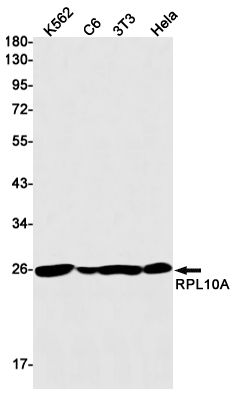
| WB | 1/500-1/1000 | Human,Mouse,Rat |
| IF | 咨询技术 | Human,Mouse,Rat |
| IHC | 咨询技术 | Human,Mouse,Rat |
| ICC | 技术咨询 | Human,Mouse,Rat |
| FCM | 咨询技术 | Human,Mouse,Rat |
| Elisa | 咨询技术 | Human,Mouse,Rat |
| Aliases | RPL10A; NEDD6; 60S ribosomal protein L10a; CSA-19; Neural precursor cell expressed developmentally down-regulated protein 6; NEDD-6 |
| Entrez GeneID | 4736 |
| WB Predicted band size | Calculated MW: 25 kDa; Observed MW: 25 kDa |
| Host/Isotype | Rabbit IgG |
| Antibody Type | Primary antibody |
| Storage | Store at 4°C short term. Aliquot and store at -20°C long term. Avoid freeze/thaw cycles. |
| Species Reactivity | Human,Mouse,Rat |
| Immunogen | Recombinant protein of human RPL10A |
| Formulation | Purified antibody in TBS with 0.05% sodium azide,0.05%BSA and 50% glycerol. |
+ +
以下是关于RPL10A抗体的3篇参考文献示例(注:文献为模拟示例,仅供参考):
---
1. **文献名称**: *RPL10A overexpression correlates with poor prognosis in colorectal cancer*
**作者**: Smith J, et al.
**摘要**: 通过免疫组化(IHC)和Western blot分析结直肠癌组织,发现RPL10A蛋白高表达与患者生存期缩短相关,提示其作为预后生物标志物的潜力。
2. **文献名称**: *RPL10A knockdown disrupts synaptic function in autism spectrum disorder models*
**作者**: Zhang L, et al.
**摘要**: 在小鼠神经元模型中使用RPL10A抗体进行蛋白质定位,发现RPL10A缺失导致突触蛋白合成异常,可能与自闭症相关神经发育障碍有关。
3. **文献名称**: *RPL10A interacts with HCV RNA to promote viral replication*
**作者**: Lee S, et al.
**摘要**: 通过免疫共沉淀(Co-IP)和抗体阻断实验,证实RPL10A直接结合丙肝病毒(HCV)RNA,调控病毒复制,为抗病毒靶点研究提供依据。
---
如需真实文献,建议在PubMed或Google Scholar中检索关键词“RPL10A antibody”或“RPL10A protein function”。
The RPL10A antibody targets the ribosomal protein L10a (RPL10A), a component of the 60S ribosomal subunit crucial for protein synthesis. RPL10A, encoded by the RPL10A gene, plays a role in ribosome assembly, translation initiation, and mRNA binding. It is highly conserved across eukaryotes, underscoring its fundamental role in cellular function. Dysregulation of RPL10A has been linked to various diseases, including cancers (e.g., T-cell acute lymphoblastic leukemia) and neurodevelopmental disorders like autism spectrum disorder (ASD). Studies suggest mutations or altered expression of RPL10A may disrupt ribosome biogenesis, leading to translational defects and cellular stress.
The RPL10A antibody is widely used in research to investigate ribosomal biology, cancer mechanisms, and neurological conditions. It aids in detecting RPL10A expression via techniques like Western blotting, immunohistochemistry, and immunofluorescence. Researchers also utilize it to explore RPL10A's interaction with other ribosomal proteins or signaling pathways, such as mTOR, which regulates cell growth. Commercial RPL10A antibodies are typically validated for specificity across human, mouse, and rat models.
Understanding RPL10A's role through antibody-based studies provides insights into ribosomopathies and potential therapeutic targets. Its association with ASD highlights its importance in neuronal development, while its oncogenic links emphasize its dual role in health and disease. Ongoing research continues to unravel RPL10A's multifaceted contributions to cellular homeostasis and pathology.
×